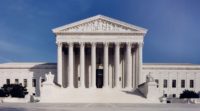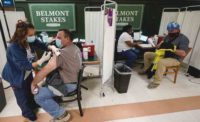UPDATE: The U.S. Supreme Court said on Dec. 21 it has set Jan. 7 for a special hearing to hear oral arguments to make an emergency ruling on whether or not to grant a stay of the US Occupational Safety and Health Administration's emergency temporary standard to require vaccination or weekly testing for all employers with 100 or more workers, while it reviews the case's legal merit.
The high court action follows the Dec. 17 ruling by a three-judge panel of the Cincinnati, Ohio, federal appeals court to lift a stay that had been set earlier by the New Orleans appellate court.
Justice Brett Kavanaugh, on Dec. 20, asked the Biden administration to respond by Dec. 30 to the appeals, signalling that the high court would rule on the vaccine mandate halt through written briefs from challengers and the Biden administration.
The high court's decision to hear the expedited oral arguments is "a rare instance — and possibly the first in decades — of the court hearing arguments on an application for a stay," says Bloomberg Law, The court is not set to resume its normal operations until Jan. 10.
The justices also will decide split decisions in lower courts over the Biden administration vaccination mandate applying to workers on federal Medicare and Medicaid programs.
In reversing the New Orleans court ruling on the stay, Cincinnati appeals court Judge Jane Stranch wrote that "under the statutory definition, any agent, including a virus, that is either 'toxic' (i.e., poisonous, toxicity) or 'physically harmful' (i.e., causing bodily harm) falls within OSHA’s purview. She said that "an agent that causes bodily harm—a virus—falls squarely within the scope of that definition," which put the vaccination or testing mandate back on track to go into effect Feb. 9, according to OSHA.
Stranch, who was appointed to the circuit by President Obama, also wrote that the OSHA standard "is an important step in curtailing the transmission of a deadly virus that has killed over 800,000 people in the United States, brought our healthcare system to its knees, forced businesses to shut down for months on end" and "a stay would risk compromising these numbers, indisputably a significant injury to the public. The harm to the Government and the public interest outweighs any irreparable injury to the individual Petitioners who may be subject to a vaccination policy."
The petitioners in the case, known as BST Holdings vs. OSHA, include the Associated General Contractors and National Association of Home Builders, as well as a number of states who all chose to appeal the case directly to the US Supreme Court on Dec. 18 for an emergency stay of the appeals court’s decision. Other petitioners, including the Associated Builders and Contractors and the Industrial Electrical Contractors, filed separate appeals on Dec. 20.
27 states and dozens of businesses and organizations joined the lawsuit against OSHA.
In a statement, a US Labor Dept. spokesperson said OSHA is "gratified" by the decision. "To provide employers with sufficient time to come into compliance, OSHA will not issue citations for noncompliance with any requirements of the ETS before January 10 and will not issue citations for noncompliance with the standard’s testing requirements before February 9, so long as an employer is exercising reasonable, good-faith efforts to come into compliance with the standard."
The department did not immediately specify what a reasonable, good-faith effort would be. The ETS will effect roughly 84 million workers who work for large employers, including contractors.
As part of its reasoning for setting the number of employees at 100 for the standard's vaccination or testing mandate and not creating separate rules for separate industries, the OSHA emergency standard states that the approach will allow the mandate to apply to two-thirds of all US private-sector workers, reaching the largest facilities where the most deadly outbreaks of COVID-19 can occur.
AGC said a persistent shortage of qualified workers is a major reason construction unemployment across the nation has only grown from pre-pandemic levels in 18 states and Washington, D.C., according to the association's recent analysis of federal employment data.
In a letter to its members Dec. 18, AGC reiterated it is "a party to the proceedings," but also encouraged increasing vaccination rates among members' workforces to comply with the ETS requirements and pointed members to its vaccine toolkit webpage. ABC also encouraged members to get their employees vaccinated while opposing the federal OSHA mandate.
“ABC today filed an emergency appeal to the U.S. Supreme Court to stay the ETS because it creates excessive compliance costs and regulatory burdens for job creators and threatens the national economy at a time when it is already contending with rising materials prices, supply chain disruptions and workforce shortages," said Ben Brubeck, ABC vice president of regulatory, labor and state affairs. "ABC continues to encourage vaccination but rejects the damaging regulatory overreach that exceeds the Department of Labor’s statutory authority."







Post a comment to this article
Report Abusive Comment